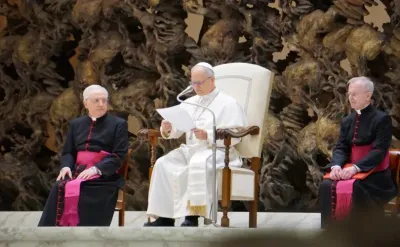The former secretary of Pope Benedict XVI expressed his forthright hope that Chicago-born Pope Leo XIV would 'guarantee stability,' suggesting that Francis had not.
VATICAN CITY (LifeSiteNews) — Pope Benedict’s former secretary has welcomed Pope Leo XIV’s papacy as bringing an end to “the season of arbitrariness.”
Speaking to Italian outlet Corriere della Serra, Archbishop Georg Gänswein offered his first comments on the newly elected Pope Leo XIV.
“When I saw him come out on the balcony of St. Peter’s Basilica I said to myself: 'Optically and acoustically, this Pope arouses hope, hope, hope.'” Such were the words of Gänswein about Cardinal Robert Francis Prevost, elected as Pope Leo XIV on Thursday evening.
Now serving as papal nuncio to Lithuania, Estonia, and Latvia, Gänswein was secretary to Pope Benedict XVI, and from 2012 through 2023 was prefect of the papal household, serving both Benedict and Francis.
Widely esteemed and beloved by long-serving Vatican employees who have been in situ prior to Pope Francis, Gänswein’s assessment of Leo pointed to the difficulties experienced under the last pontificate:
Now a new phase opens. I sense some widespread relief. The season of arbitrariness is over. We can begin to rely on a papacy that can guarantee stability and rely on existing structures, without overturning and upsetting them.
Predicting the style of the pontificate which Leo will have, Gänswein suggested the American Pope would seek to create peace and resolve conflicts:
Leo XIV will create bridges like his predecessor. But in a different context and style than Francis. In the Church today there are great tensions, and outside there are frightening conflicts. I think doctrinal clarity is needed now. The confusion of these years must be overcome.
And one of the tools to be used are the structures that are already there. The institutions of the Church are neither a leprosy nor a threat against the Pope. They are there to provide help to the pontiffs, who must get help. One cannot govern alone, distrusting one's own institutions.
Such comments could well be taken to refer to the governance style of Francis’ papacy, which was widely understood to be erratic and even described as dictator-like or tyrannical by those closely acquainted with it.
Further highlighting what he sees as differences between Francis and Leo, rather than the “continuity” which is much talked about, Gänswein commented that Leo’s choice of vestments already evidences a change in tack:
Name and dress made it clear that there will be no continuity but a totally new phase. His experience, ability to speak many languages, the fact that he was a missionary but also worked in the Curia for two years make him a Pope who is both a pastor and a governing Pope. He does not come from one background but from many things together. And this will allow him to speak to everyone.
Leo has indeed made notable impressions in recent days on this front. Although small signs in the grander scheme of doctrinal confusion, his decision to use the red mozzetta and stole – eschewed by Francis – to sing the Regina Caeli, and the rumors of his potential return to the papal apartments Francis rejected, have won him early fans among traditional Catholics.
Not yet a week into his papacy, Leo's decisions will come under particular scrutiny, with cardinals around him describing the Pope as measured but decisive. So far he has asked the Roman curial heads to remain in place for the time being.
Though Prevost was listed amongst the papabile cardinals, his name was not among the most anticipated contenders for the papacy, not least for the fact that few believed it likely for the College of Cardinals to choose an American pope.
For Gänswein too, Prevost’s election came as a surprise after the German prelate had anticipated the election of Cardinal Secretary of State Pietro Parolin. But swiftly adapting to the new Pope, Gänswein drew on his personal encounters with Prevost from former years, attesting that “Pope Prevost gives me great hope. I am convinced that he will make a positive impact within the Church and in the world. He is a peacemaker.”
Gänswein was seen as much more aligned with Benedict than Francis in theology, liturgy, and doctrinal practice, and as time went on was viewed to have fallen out of favor with Pope Francis. In his revelatory book published just after Benedict’s death, Gänswein outlined how Francis’ restrictions on the Latin Mass greatly pained Benedict in his retirement.
After Gänswein ended his term at the papal household he was left without a position by the late pope, further highlighting the tense relationship believed to exist between the two. It was only a year later he was announced as nuncio.
The prelate has been careful to avoid entering into direct media conflict with Pope Francis, despite the optics of disharmony between the two.
But the nuncio's comments should not be attributed to some personal rancor against the recently deceased Francis as many cardinals have expressed similar thoughts and hopes for the new pontificate.
Robert Cardinal Sarah wrote that the election of Leo XIV was a "great joy," while others in the College of Cardinals such as Blase Cupich and Joseph Tobin also welcomed the news positively.
New York's Timothy Cardinal Dolan has been described as an influential "kingmaker" to garner support for Prevost within the conclave, though such information cannot be confirmed due to the strict rules of secrecy surrounding the conclave process.

